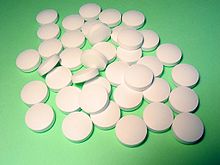Recent research published in the journal Cancer has found that people who regularly take painkillers such as aspirin can reduce skin cancer risk by up to 15%. The study looked at 200,000 people in Denmark and measured the number of patients taking non-steroidal anti-inflammatory drugs (NSAIDs), and the number of patients who developed of the three types of skin cancer, basal cell carcinoma, squamous cell carcinoma, or malignant melanoma.
 Approximately 18,000 of the participants were diagnosed with one form of skin cancer and their medical records were checked to see how many had been prescribed NSAIDs such as aspirin and ibuprofen. The researchers found that those who were frequently prescribed these painkillers for conditions such as heart disease or arthritis were less likely to develop skin cancer. It was also found that the higher the dosage and the longer period the medication had been prescribed for, the greater the reduced risk of developing the cancer. Those participants with more than two prescriptions for NSAIDS had a 15% lower risk of developing squamous cell carcinoma and a 13% lower risk of developing malignant melanoma.
Approximately 18,000 of the participants were diagnosed with one form of skin cancer and their medical records were checked to see how many had been prescribed NSAIDs such as aspirin and ibuprofen. The researchers found that those who were frequently prescribed these painkillers for conditions such as heart disease or arthritis were less likely to develop skin cancer. It was also found that the higher the dosage and the longer period the medication had been prescribed for, the greater the reduced risk of developing the cancer. Those participants with more than two prescriptions for NSAIDS had a 15% lower risk of developing squamous cell carcinoma and a 13% lower risk of developing malignant melanoma.
It has previously been suggested that NSAIDs work by blocking the growth of pre-cancerous lesions and can protect against many cancers such as bowel cancer. Hazel Nunn of Cancer Research UK responded to the study by stating that “…the best way to reduce risk of skin cancer is to enjoy the sun safely, and take care to avoid sunburn.”
If you are concerned about your skin cancer risk, Consultant-Search has a number of expert dermatologists who can help.
Non-steroidal anti-inflammatory drugs. A group of drugs that provide pain relief and reduce inflammation.
Full medical glossary

